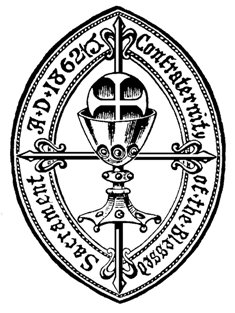Anglicanism is a Western Christian tradition that has developed from the practices, liturgy, and identity of the Church of England following the English Reformation, in the context of the Protestant Reformation in Europe. It is one of the largest branches of Christianity, with around 110 million adherents worldwide as of 2001.
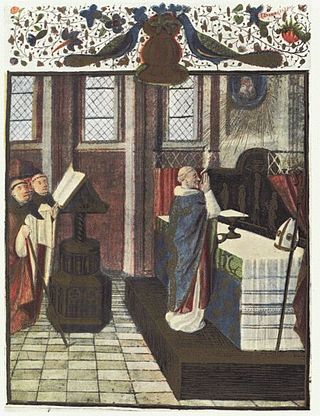
Mass is the main Eucharistic liturgical service in many forms of Western Christianity. The term Mass is commonly used in the Catholic Church, Western Rite Orthodoxy, Old Catholicism, and Independent Catholicism. The term is also used in some Lutheran churches, as well as in some Anglican churches, and on rare occasion by other Protestant churches.

Anglo-Catholicism comprises beliefs and practices that emphasise the catholic heritage and identity of the various Anglican churches.

The Anglican Use, also known as Divine Worship, is a use of the Roman Rite celebrated by the personal ordinariates, originally created for former Anglicans who converted to Catholicism while wishing to maintain "aspects of the Anglican patrimony that are of particular value" and includes former Methodist converts to Catholicism who wish to retain aspects of Anglican and Methodist “heritage, liturgy, and tradition. Its most common occurrence is within parishes of the personal ordinariates which were erected in 2009. Upon the promulgation of Divine Worship: The Missal, and the term "Anglican Use" was replaced by "Divine Worship" in the liturgical books and complementary norms, though "Anglican Use" is still used to describe these liturgies as they existed from the papacy of John Paul II to present.

Eucharistic adoration is a Eucharistic devotional practice primarily in Western Catholicism, but also to a lesser extent in certain Lutheran and Anglican traditions, in which the Blessed Sacrament is adored by the faithful. This practice may occur either when the Eucharist is exposed, or when it is not publicly viewable because it is reserved in a place such as a church tabernacle.
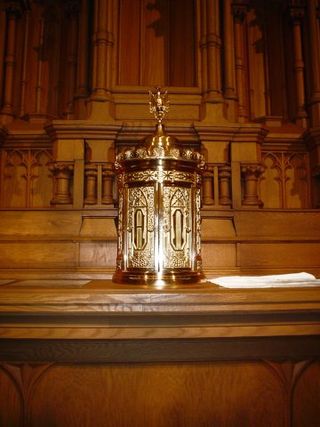
A tabernacle or a sacrament house is a fixed, locked box in which the Eucharist is stored as part of the "reserved sacrament" rite. A container for the same purpose, which is set directly into a wall, is called an aumbry.

The 'Guild of All Souls is an Anglican devotional society dedicated to prayer for faithful departed Christians. As stated on its website, it is a "devotional society praying for the souls of the Faithful Departed, and teaching the Catholic doctrine of the Communion of Saints."
Anglican Papalism, also referred to as Anglo-Papalism, is a subset of Anglo-Catholicism with adherents manifesting a particularly high degree of influence from, and even identification with, the Roman Catholic Church. This position has historically been referred to as Anglican Papalism; the term Anglo-Papalism is an American neologism and it seems not to have appeared in print prior to the 1990s. Anglican Papalists have suggested "that the only way to convert England is by means of an 'English Uniate' rite". Anglican Papalists have historically practiced praying the Dominican rosary, among other Marian devotions, Corpus Christi procession, as well as the reservation of and Benediction of the Blessed Sacrament.
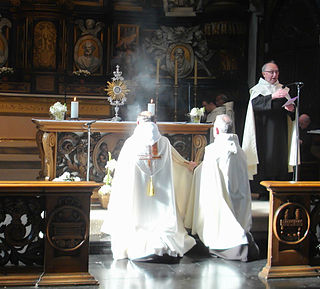
Benediction of the Blessed Sacrament, also called Benediction with the Blessed Sacrament or the Rite of Eucharistic Exposition and Benediction, is a devotional ceremony, celebrated especially in the Roman Catholic Church, but also in some other Christian traditions such as Anglo-Catholicism, whereby a bishop, priest, or a deacon blesses the congregation with the Eucharist at the end of a period of adoration.

Latin liturgical rites, or Western liturgical rites, is a large family of liturgical rites and uses of public worship employed by the Latin Church, the largest particular church sui iuris of the Catholic Church, that originated in Europe where the Latin language once dominated. Its language is now known as Ecclesiastical Latin. The most used rite is the Roman Rite.

During the Mass of the Faithful, the second part of the Mass, the elements of bread and wine are considered to have been changed into the veritable Body and Blood of Jesus Christ. The manner in which this occurs is referred to by the term transubstantiation, a theory of St. Thomas Aquinas, in the Roman Catholic Church. Members of the Orthodox, Anglican, and Lutheran communions also believe that Jesus Christ is really and truly present in the bread and wine, but they believe that the way in which this occurs must forever remain a sacred mystery. In many Christian churches some portion of the consecrated elements is set aside and reserved after the reception of Communion and referred to as the reserved sacrament. The reserved sacrament is usually stored in a tabernacle, a locked cabinet made of precious materials and usually located on, above, or near the high altar. In Western Christianity usually only the Host, from Latin: hostia, meaning "victim", is reserved, except where wine might be kept for the sick who cannot consume a host.

Anglican eucharistic theology is diverse in practice, reflecting the comprehensiveness of Anglicanism. Its sources include prayer book rubrics, writings on sacramental theology by Anglican divines, and the regulations and orientations of ecclesiastical provinces. The principal source material is the Book of Common Prayer, specifically its eucharistic prayers and Article XXVIII of the Thirty-Nine Articles. Article XXVIII comprises the foundational Anglican doctrinal statement about the Eucharist, although its interpretation varies among churches of the Anglican Communion and in different traditions of churchmanship such as Anglo-Catholicism and Evangelical Anglicanism.
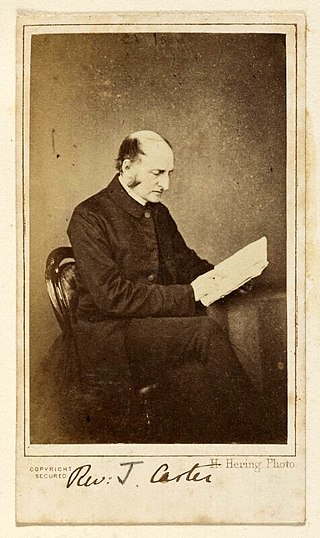
Thomas Thellusson Carter, often known as T. T. Carter, was a significant figure in the Victorian Church of England. He was responsible for reintroducing some Catholic practices to the church and being the founder of the Confraternity of the Blessed Sacrament. He also founded several charitable organisations. He was a prolific writer on church matters and a project exists to collect and collate all his writings. He was for 36 years the Rector of Clewer and an honorary canon of Christ Church Cathedral, Oxford.
The Priests' Eucharistic League was a Roman Catholic confraternity set up in the nineteenth century, with primary object the frequent and prolonged worship of the Blessed Sacrament by priests.
A personal ordinariate for former Anglicans, shortened as personal ordinariate or Anglican ordinariate, is an ordinariate, a canonical structure within the Catholic Church established in order to enable "groups of Anglicans" and Methodists to join the Catholic Church while preserving elements of their liturgical and spiritual patrimony.
This is a glossary of terms used within the Catholic Church. Some terms used in everyday English have a different meaning in the context of the Catholic faith, including brother, confession, confirmation, exemption, faithful, father, ordinary, religious, sister, venerable, and vow.
Paul Stewart Williamson is a retired Anglo-Catholic priest in the Church of England. He has brought a number of high-profile and controversial civil suits in English courts over matters of Anglican faith and practice, including the ordination of women to the priesthood, the legality of the marriage of Charles, Prince of Wales to Camilla, Duchess of Cornwall and has challenged the retirement age of 70 within the Church of England.

The Personal Ordinariate of the Chair of Saint Peter is a Latin Church ecclesiastical jurisdiction or personal ordinariate of the Catholic Church for Anglican and Methodist converts in the United States and Canada. It allows these parishioners to maintain elements of Anglican liturgy and tradition in their services. The ordinariate was established by the Vatican in 2012.
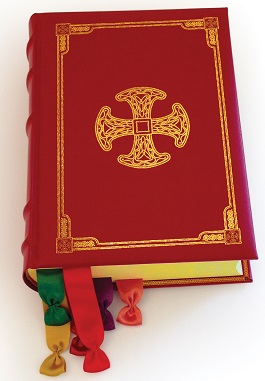
Divine Worship: The Missal (DW:TM) is the liturgical book containing the instructions and texts for the celebration of Mass by the former Anglicans within the Catholic Church in the three personal ordinariates of Great Britain, United States and Canada, and Australia. The rite contained in this missal is the Anglican Use, a liturgical use of the Roman Rite Mass with elements of Anglican worship. It was approved for use beginning on the first Sunday of Advent, November 29, 2015.
